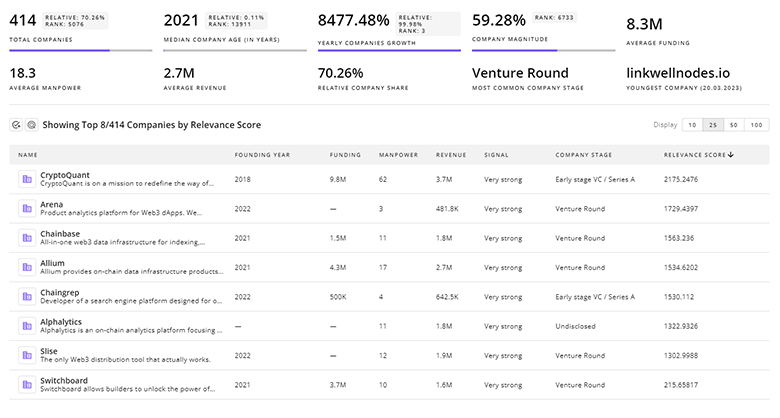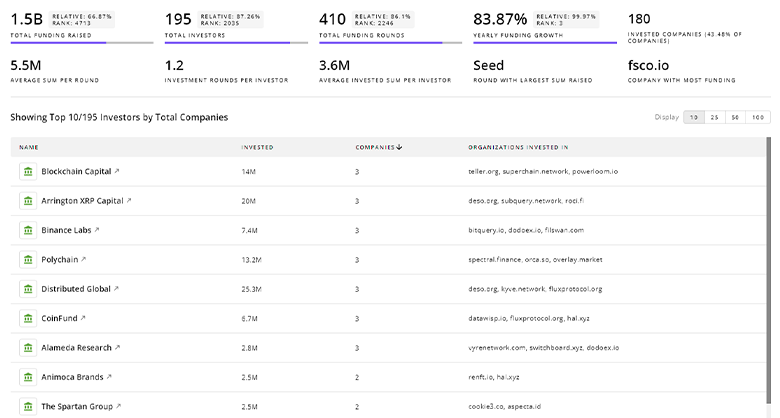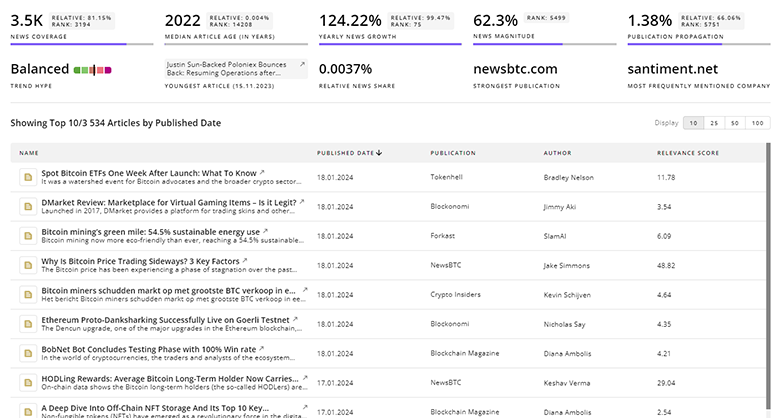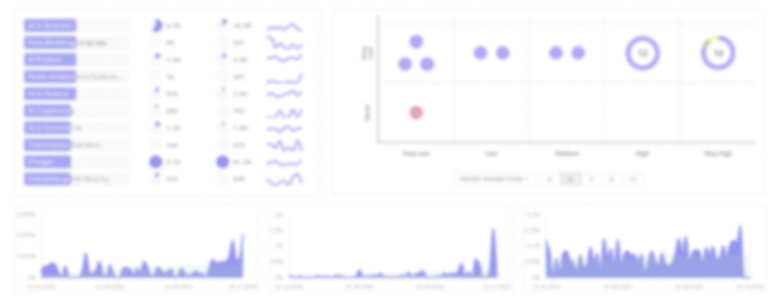
Business Intelligence Report
: Analysis on the Market, Trends, and TechnologiesThe business intelligence market is at an inflection point: global BI revenue stood at USD 33.12 billion in 2024 and the internal data projects growth to USD 78.42 billion by 2032 (13.1% CAGR), driven by cloud migration, AI-enhanced analytics, and rapid adoption of self-service tools. This report synthesizes patent activity, market forecasts, vendor positioning, and company-level signals to identify where near-term value will be created (AI-augmented insight engines, unified data fabrics, self-service embedded analytics) and what practical choices product and investment teams must prioritize to convert these trends into measurable outcomes.
This report was last updated 43 days ago. Spot an error or missing detail? Help us fix it by getting in touch!
Topic Dominance Index of Business Intelligence
To identify the Dominance Index of Business Intelligence in the Trend and Technology ecosystem, we look at 3 different time series: the timeline of published articles, founded companies, and global search.
Key Activities and Applications
- Data integration and unified data stores: consolidating ERP, CRM, IoT, and external feeds into governed warehouses or lakehouses to create a single source of truth for analytics.
- Self-service analytics and dashboarding: enabling business users to create reports and run KPI monitoring with low-code/no-code interfaces to reduce IT bottlenecks and accelerate decision cycles gminsights – 2024.
- AI-augmented insight generation: applying ML for forecasting, anomaly detection, and natural-language query interfaces so users receive prescriptive recommendations as part of workflows.
- Embedded analytics and contextual BI: placing analytics directly inside SaaS and enterprise apps so insights appear at the point of decision rather than in separate tooling alliedmarketresearch – 2025.
- Real-time and operational analytics: streaming and edge analytics for supply chain, manufacturing, and telecom use cases where sub-second metrics and alerts enable operational actions marketresearchfuture – 2025.
- Industry-specific BI: packaged solutions for verticals (rail, automotive, pharma, utilities) that embed domain logic, KPIs, and forecast models to shorten time to value autobi.co.uk.
So what: Organizations that prioritize data consolidation, lower the bar for non-technical users, and deploy AI where it produces actionable recommendations will shorten decision latency and increase ROI from BI investments.
Emergent Trends and Core Insights
- AI becomes core product capability, not a marketing badge. Generative AI and conversational interfaces shift BI from static dashboards to interactive inquiry and recommended actions, increasing analyst productivity and adoption.
- Cloud-first converts into cloud-native pattern: faster deployments, pay-as-you-grow economics, and multi-tenant analytics accelerate adoption—cloud BI captured majority share in recent studies and enables smaller teams to operate like enterprise analytics units.
- Democratization of analytics via no-code and augmented analytics increases non-technical usage beyond 60% adoption of self-service patterns, but it creates governance risk if data quality and lineage are not enforced.
- Consolidation pressure around integrated AI-BI platforms. Market signals show incumbents and large platform vendors investing heavily in AI, while smaller specialists either integrate or double down on defensible vertical features.
- Governance and compliance become differentiators. With data sovereignty and regulation tightening, vendors offering built-in governance, lineage, and secure embedded analytics gain trust from large buyers researchandmarkets – 2025.
So what: Vendors that combine AI-first analytics, strong data governance, and simple user experiences will capture the accelerating demand from both enterprise and mid-market buyers thebusinessresearchcompany – 2025.
Technologies and Methodologies
- Cloud data platforms and lakehouse architectures: Snowflake/Azure/AWS ecosystems for elastic compute and governed data access marketresearchfuture – 2025.
- AI/ML and generative models: embedding ML for forecasting, anomaly detection, causal analysis, and natural language querying; generative models used for metric synthesis and automated narrative generation.
- Low-code/no-code and self-service UX patterns: drag-and-drop builders, template libraries, and visual query layers to increase adoption among business users.
- Streaming and in-database analytics: vectorized, GPU-accelerated query engines and streaming frameworks for operational RTBI scenarios.
- Semantic/knowledge layers and data fabrics: universal semantic layers, knowledge graphs, and data virtualization to provide consistent business metrics across tools.
- Rigorous data governance and lineage: automated cataloging, policy enforcement, and certified datasets to ensure trust as self-service scales.
So what: Teams must select architectures that balance speed (self-service, cloud) with control (governance, semantic layers). Investment priorities that reflect this balance produce faster user adoption without increasing risk.
Business Intelligence Funding
A total of 5.8K Business Intelligence companies have received funding.
Overall, Business Intelligence companies have raised $189.6B.
Companies within the Business Intelligence domain have secured capital from 20.0K funding rounds.
The chart shows the funding trendline of Business Intelligence companies over the last 5 years
Business Intelligence Companies
- Acquis BI — Specialized in secure cloud-based integration platforms that connect disparate government and healthcare systems to produce trusted, governed BI datasets. Acquis BI positions itself as an integration and security specialist for regulated domains, shortening time to insight by focusing on compliant data pipelines and certified connectors.
- BI42.ai — Provides a generative AI-driven BI layer that lets users interrogate enterprise data conversationally and receive interactive visualizations. BI42.ai targets teams that require rapid, ad-hoc access to insights across multiple internal sources and emphasizes instant, query-driven intelligence rather than heavy ETL cycles.
- FirmoGraphs — Focuses on firmographic and infrastructure intelligence for heavy-industry and utilities markets. Their domain dataset and market segmentation approach help B2B sellers and planners target industrial customers with precision, converting vertical data into prioritized go-to-market actions.
- Rail BI — Niche vertical BI for railway infrastructure managers delivering cost estimation, scenario planning, and asset performance dashboards. Rail BI reduces the effort to prepare investment business cases and aligns operational KPIs to financial planning for transport authorities.
- Zebra BI — Specializes in best-practice visuals and reporting components for Power BI, Excel, and PowerPoint to make financial and operational reporting clearer and faster to produce. Zebra BI’s strength is rapid report standardization and reader-centric visuals that improve decision clarity for finance teams.
Identify and analyze 71.5K innovators and key players in Business Intelligence more easily with this feature.

71.5K Business Intelligence Companies
Discover Business Intelligence Companies, their Funding, Manpower, Revenues, Stages, and much more
Business Intelligence Investors
TrendFeedr’s investors tool offers a detailed view of investment activities that align with specific trends and technologies. This tool features comprehensive data on 16.2K Business Intelligence investors, funding rounds, and investment trends, providing an overview of market dynamics.

16.2K Business Intelligence Investors
Discover Business Intelligence Investors, Funding Rounds, Invested Amounts, and Funding Growth
Business Intelligence News
Stay informed and ahead of the curve with TrendFeedr’s News feature, which provides access to 41.5K Business Intelligence articles. The tool is tailored for professionals seeking to understand the historical trajectory and current momentum of changing market trends.

41.5K Business Intelligence News Articles
Discover Latest Business Intelligence Articles, News Magnitude, Publication Propagation, Yearly Growth, and Strongest Publications
Executive Summary
The business intelligence opportunity now favors pragmatic platform strategies that blend three capabilities: (1) trusted, governed data fabrics that provide a single source of truth; (2) AI-first analytics that convert data into recommended actions and natural-language interaction; and (3) low-friction self-service and embedded experiences that put insights directly into operational workflows. Market projections show sizable expansion over the next decade, so teams must prioritize measurable pilots that prove three things quickly: data quality and lineage at scale, AI features that reduce analyst hours per insight, and clear business metrics (revenue uplift, cost saved, decision time reduced). Vendors and buyers who align architecture, governance, and UX to those outcomes will capture disproportionate value as the BI market consolidates around integrated, AI-enabled solutions marketresearchfuture – 2025 IDC (marketresearch) – 2024.
Interested in enhancing our coverage of trends and tech? We value insights from experts like you - reach out!











